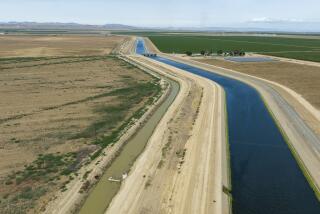A Plausible Pause: It’s the Economy : Wilson opts to slow down on water projects
- Share via
Gov. Pete Wilson’s lack of enthusiasm for the historic water reform bill that Congress enacted last year was notorious, of course. He even tried to get then-President George Bush to veto it. But it’s the law now, fortunately, and must be implemented if sound economic principles are to be allowed to determine how California’s water is sold.
Recently, however, Wilson held back on paying California’s $150-million share for environmental improvements required under the new federal law. (The rest of the money, about $550 million, is to come from the federal government and major water customers.) Environmentalists suspect the governor is trying to sabotage the law.
Wilson blames the delay on the state’s budget crisis. He says the state deficit has left Sacramento short of money to pay for welfare and schools, much less projects like installing temperature control devices at Shasta Dam to protect migrating fish.
For now his explanation seems entirely plausible. But at some point he must concede that the new federal water law needs to go into full effect. And Wilson, or some future governor, must be prepared to pay the state’s share. The longer the delay in full implementation, the longer a costly and inefficient water distribution system will subsidize big farms and rural water districts to the detriment of the overwhelming majority of Californians--those who live and work in cities.
The new federal law is so important because it created a free market for about 20% of California’s water supply, the amount distributed through the Central Valley Project, a series of dams and canals built with federal funds. For more than 50 years that water was sold only to farmers, and at subsidized prices. Now farmers will be allowed to sell surplus water to cities at free market prices. That will make it easier for cities during droughts.
Resistance to the law has come mainly from a few big farmers who don’t want to give up cheap water and from rural water districts, which will lose political clout if they lose control of their water.
Although for now we are willing to take Wilson at his word that the problem is budgetary, there remains something he can do--as a show of good faith--to help water reform along while riding out the state’s recession. He can urge the Legislature to finish drafting the state laws needed to make sure the new federal rules work as efficiently as possible.
Pending in the Legislature is a bill that would do just that, AB 97 by Assemblyman Dominic L. Cortese (D-San Jose). It needs fine-tuning, but it’s a step in the right direction. Wilson should encourage the Legislature to revise AB 97 and he should promise to sign it.
More to Read
Get the L.A. Times Politics newsletter
Deeply reported insights into legislation, politics and policy from Sacramento, Washington and beyond. In your inbox twice per week.
You may occasionally receive promotional content from the Los Angeles Times.










